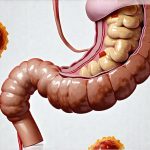Anxiety and digestive issues often dance a frustrating two-step, each exacerbating the other in a seemingly endless cycle. Many people experience this firsthand – a churning stomach before a stressful event, increased bloating during periods of high anxiety, or even full-blown digestive distress triggered by worry. It’s not simply “in your head,” though it feels that way sometimes. There’s a powerful and deeply interconnected relationship between the brain (our emotional center) and the gut (often called our “second brain”), known as the gut-brain axis. Understanding this connection is the first, crucial step in breaking free from this debilitating loop and restoring both mental and physical wellbeing. This article will delve into the science behind this interplay, explore practical strategies for managing anxiety and improving digestion, and offer a roadmap toward a more balanced and comfortable life.
The conventional approach often treats these symptoms separately – anti-anxiety medication for the mind, and antacids or dietary restrictions for the gut. While sometimes necessary, this fragmented approach rarely addresses the root cause of the problem. It’s like treating the branches of a tree while ignoring the damaged roots. True healing requires recognizing that anxiety and digestive chaos aren’t isolated issues but rather different manifestations of an underlying imbalance. The goal isn’t just to suppress symptoms but to cultivate resilience – both mentally and physically – so you can navigate life’s stressors with greater ease and maintain a healthy, happy gut. This means looking beyond quick fixes and embracing holistic strategies that address the whole person.
The Gut-Brain Axis: A Two-Way Street
The gut-brain axis isn’t some esoteric concept; it’s a well-established scientific reality. It’s a complex network involving direct neural pathways (like the vagus nerve, which runs directly from your brain to your gut), hormonal signaling, and – increasingly recognized as vital – the microbiome: the trillions of bacteria, fungi, viruses, and other microorganisms that live in our digestive tract. This microbial community isn’t just passively residing within us; it actively communicates with our brains, influencing everything from mood and cognition to immune function and stress response.
Think of your gut microbiome as a bustling ecosystem. A diverse and thriving microbiome produces beneficial compounds like short-chain fatty acids (SCFAs), which nourish the gut lining, reduce inflammation, and even impact brain health. Conversely, an imbalanced microbiome – often caused by factors like poor diet, chronic stress, or antibiotic use – can lead to increased intestinal permeability (“leaky gut”), triggering immune activation and contributing to anxiety and depression. This imbalance also affects neurotransmitter production; a significant amount of serotonin (the “happy hormone”) is actually produced in the gut!
This two-way communication means that anxiety doesn’t just affect your gut, and gut issues don’t just stay in your gut. Stress hormones released during anxious moments directly impact digestive function, slowing down motility, reducing enzyme production, and altering gut permeability. Conversely, inflammation in the gut can send signals to the brain, contributing to feelings of anxiety, fatigue, and even cognitive impairment. It’s a vicious cycle that requires understanding and targeted intervention.
Calming the Nervous System & Supporting Digestion
Breaking the loop starts with strategies that simultaneously address both mental and physical wellbeing. Focusing solely on one aspect rarely yields lasting results. A key component is learning to calm your nervous system. Chronic stress keeps us in a state of “fight-or-flight,” diverting energy away from digestive processes and exacerbating anxiety. Techniques like mindfulness meditation, deep breathing exercises, yoga, and spending time in nature can help shift the body out of this stressed state and into a more relaxed parasympathetic mode – the “rest and digest” response crucial for optimal digestion.
Dietary changes are equally important. A diet rich in whole, unprocessed foods provides the nutrients necessary for both brain and gut health. Specifically:
– Fiber-rich foods (fruits, vegetables, whole grains) feed beneficial gut bacteria.
– Fermented foods (yogurt, kefir, sauerkraut, kimchi) introduce probiotics – live microorganisms that can help restore microbial balance.
– Omega-3 fatty acids (found in fatty fish, flaxseeds, chia seeds) have anti-inflammatory properties and support brain function.
– Reducing processed foods, sugar, caffeine, and alcohol is crucial, as these can disrupt gut health and exacerbate anxiety.
It’s also important to be mindful of how you eat. Rushing through meals, eating while distracted, or consuming food on the go hinders proper digestion. Practicing mindful eating – savoring each bite, chewing thoroughly, and paying attention to your body’s hunger and fullness cues – can significantly improve digestive function and reduce stress around mealtimes.
Identifying & Addressing Your Triggers
Anxiety rarely appears out of nowhere. Often, it’s triggered by specific situations, thoughts, or beliefs. Similarly, digestive distress may be linked to particular foods or eating habits. The first step in breaking the loop is identifying your personal triggers. This requires honest self-reflection and potentially keeping a journal to track both your anxiety levels and digestive symptoms.
- What situations consistently trigger your anxiety? Is it public speaking, social gatherings, work deadlines, or something else entirely?
- Are there specific foods that seem to worsen your digestive symptoms? Common culprits include gluten, dairy, FODMAPs (fermentable carbohydrates), and spicy foods.
- Do you notice a connection between your stress levels and your digestive issues?
Once you’ve identified potential triggers, you can begin to develop strategies for managing them. This might involve:
1. Developing coping mechanisms for stressful situations (e.g., deep breathing exercises, visualization techniques).
2. Experimenting with dietary modifications (e.g., eliminating trigger foods temporarily to see if symptoms improve).
3. Working with a therapist or counselor to address underlying anxiety-provoking thoughts and beliefs.
The Power of Movement & Sleep
Physical activity is a powerful tool for both managing anxiety and improving digestion. Exercise releases endorphins, which have mood-boosting effects, and helps reduce stress hormones. Regular movement also stimulates gut motility, promoting healthy bowel function. It doesn’t need to be intense; even a brisk walk, yoga session, or dance class can make a significant difference.
Similarly, prioritizing sleep is essential. Sleep deprivation exacerbates anxiety and disrupts both brain and gut function. Aim for 7-9 hours of quality sleep each night. Create a relaxing bedtime routine that includes activities like taking a warm bath, reading a book, or listening to calming music. Avoid screen time before bed, as the blue light emitted from electronic devices can interfere with sleep. A consistent sleep schedule is also incredibly important – going to bed and waking up around the same time each day helps regulate your body’s natural rhythms.
Cultivating Self-Compassion & Seeking Support
Finally, remember that breaking this loop takes time and effort. There will be setbacks along the way. Be kind to yourself and practice self-compassion. Avoid harsh self-criticism and focus on celebrating small victories. Don’t hesitate to seek support from friends, family, or a healthcare professional. A therapist can provide guidance and tools for managing anxiety, while a registered dietitian can help you develop a personalized nutrition plan that supports both your mental and physical wellbeing. You are not alone in this journey, and seeking help is a sign of strength, not weakness. Building a strong support system and prioritizing self-care are essential components of long-term healing and resilience.


















